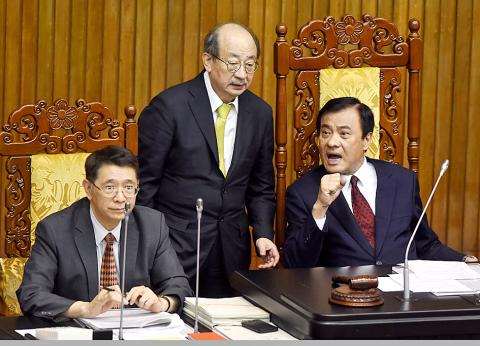Lawmakers yesterday amended the Code of Criminal Procedure (刑事訴訟法) to provide a legal basis for travel restrictions, which were previously enforced on the basis of rules governing limitation of the residence of a person of interest.
The amendment added a chapter titled “restrictions on departures,” which cover departures of a defendant by air or by sea.
The code lacked clear regulations on travel restrictions, which in practice had been imposed as a limitation of the residence of a defendant, said Democratic Progressive Party Legislator Chou Chun-mi (周春米), a sponsor of the amendment.

Photo: Chien Jung-fong, Taipei Times
However, the concept of a limitation of residence does not necessarily justify the judiciary depriving a defendant of their “freedom to change residence,” which is granted by the Constitution, she said.
The amendment is meant to differentiate between limitation of residence and travel restrictions, she added.
With the exception of crimes whose severest punishment is a fine or detention, a prosecutor or a judge may place departure restrictions on a defendant who does not have a fixed residence or lodging, or who is likely to flee the country; conceal, tamper with or destroy evidence; or conspire with others to give false testimonies, the amendment says.
A travel restriction must not last longer than eight months, but may be extended for up to two times, with the first extension no longer than four months and the second no longer than two, it says.
The combined duration of travel restrictions imposed on a defendant whose alleged crime is punishable by a prison term of up to 10 years must not exceed five years, whereas the overall duration for those who have been accused of committing other crimes must not exceed 10 years, it says.
For defendants granted a deferred sentence, parole, non-prosecution or an acquittal, the departure restrictions will no longer apply, but new restrictions can be put in place if the case is subject to an appeal, it says.
A defendant or their attorney may apply to a prosecutor or judge to have a travel restriction revoked or changed, but if a case is being reviewed, the right to change or revoke a travel ban resides with the presiding judge, it says.
The aforementioned rules also apply to people who are on parole, subject to limitation of residence, or are under investigation, but not detained, it says.
A defendant may file an interlocutory appeal against a travel restriction, it says.
Legislators approved another amendment to the code that would grant defendants the right to view, transcribe or photograph court documents and evidence presented against them after gaining the consent of a court.
However, a court may turn down a defendant’s request to exercise the aforementioned right if it believes it would affect the adjudication of another case; would not help with their legal defense in a court; or if the documents or evidence requested are irrelevant to the crimes of which they are accused, the amendment stipulates.
A defendant may appeal a court decision that denies them access to court documents or evidence, it says.

The first global hotel Keys Selection by the Michelin Guide includes four hotels in Taiwan, Michelin announced yesterday. All four received the “Michelin One Key,” indicating guests are to experience a “very special stay” at any of the locations as the establishments are “a true gem with personality. Service always goes the extra mile, and the hotel provides much more than others in its price range.” Of the four hotels, three are located in Taipei and one in Taichung. In Taipei, the One Key accolades were awarded to the Capella Taipei, Kimpton Da An Taipei and Mandarin Oriental Taipei. Capella Taipei was described by

The Taichung District Court yesterday confirmed its final ruling that the marriage between teenage heir Lai (賴) and a man surnamed Hsia (夏) was legally invalid, preventing Hsia from inheriting Lai’s NT$500 million (US$16.37 million) estate. The court confirmed that Hsia chose not to appeal the civil judgement after the court handed down its ruling in June, making the decision final. In the June ruling, the court said that Lai, 18, and Hsia, 26, showed “no mutual admiration before the marriage” and that their interactions were “distant and unfamiliar.” The judge concluded that the couple lacked the “true intention of

EVA Airways today confirmed the death of a flight attendant on Saturday upon their return to Taiwan and said an internal investigation has been launched, as criticism mounted over a social media post accusing the airline of failing to offer sufficient employee protections. According to the post, the flight attendant complained of feeling sick on board a flight, but was unable to take sick leave or access medical care. The crew member allegedly did not receive assistance from the chief purser, who failed to heed their requests for medical attention or call an ambulance once the flight landed, the post said. As sick

INDUSTRY: Beijing’s latest export measures go beyond targeting the US and would likely affect any country that uses Chinese rare earths or related tech, an academic said Taiwanese industries could face significant disruption from China’s newly tightened export controls on rare earth elements, as much of Taiwan’s supply indirectly depends on Chinese materials processed in Japan, a local expert said yesterday. Kristy Hsu (徐遵慈), director of the Taiwan ASEAN Studies Center at the Chung-Hua Institution for Economic Research, said that China’s latest export measures go far beyond targeting the US and would likely affect any country that uses Chinese rare earths or related technologies. With Japan and Southeast Asian countries among those expected to be hit, Taiwan could feel the impact through its reliance on Japanese-made semi-finished products and